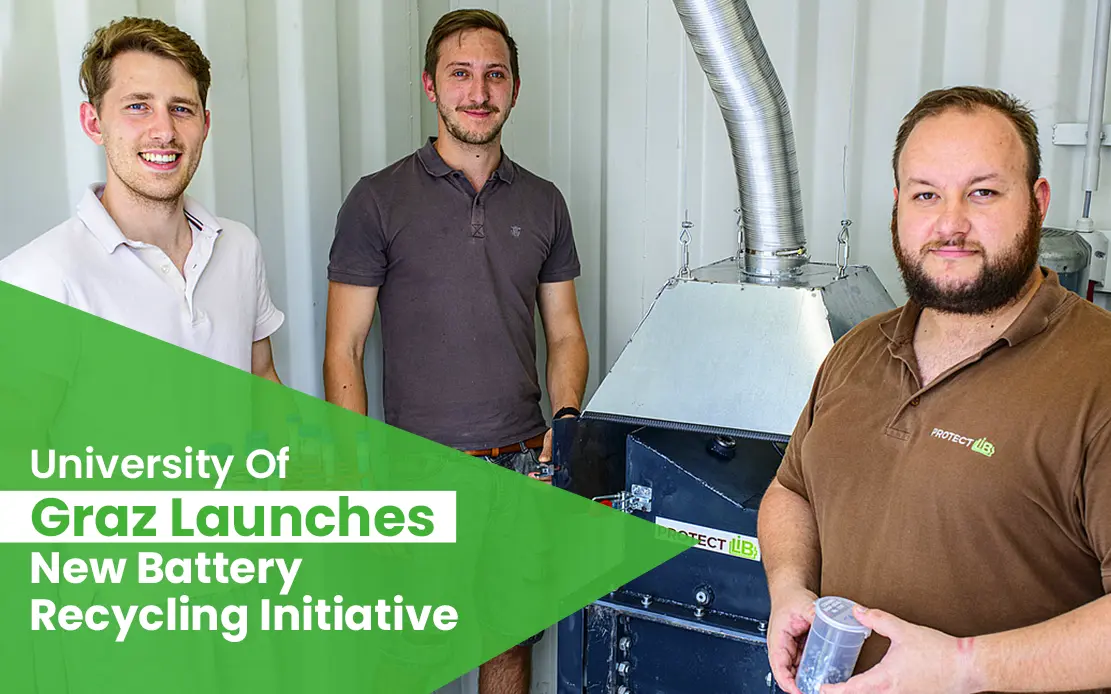University of Graz has launched a unique prototype to recycle lithium batteries primarily originating from electric vehicles. It is a compact system ready for recycling at the institute.
The project is currently restricted to the recycling of only automotive batteries, however, founders of the system suggest that in the future laptop and mobile phone batteries might also be considered. The first prototype of the project is completed and stands proudly in the campus of University of Graz, Austria.
The initiators of this project labeled as ‘Protect LiB’ argue that the aim of this container-sized recycling plant is to enable the efficient recycling of valuable raw materials from used lithium ion batteries directly on-site.
Jürgen Abraham, Tobias Kopp and Chris Pichler , the creators of the ‘Protect LiB’ founded the breakthrough project at the Unicorn start-up incubator present in the University of Graz.
When asked about how this new battery recycling technique differs from the existing procedures Kopp elaborated “ We can separate lithium, cobalt and nickel from the liquid electrolytes. Unlike existing processes, we can do this without heat.” Kopp further added that this is a huge advantage for customers, as the residual materials are no longer hazardous, and further processing and transport are considerably cheaper.”
The successful spin-off has already bagged a customer in the south of Graz and as per Kopp “ battery prototypes for transport are being developed there. In future, the technology of ProtectLiB will enable the company to recycle these directly on site.”
The developers of the ‘Protect LiB’ recently posted on LinkedIn about the need to develop and invest in efficient and innovative recycling methods. In their post they pointed out three key concerns. Firstly, batteries are manufactured globally but recycled locally. This poses significant challenges for the recycling process, especially regarding the granularity of the contents. Secondly, battery recycling efforts will only contribute towards sustainability and promote the circular economy model if the access to these procedures is carefully mapped out. Lastly, the creators of the project stressed the need to collect accurate data regarding battery recycling stats and also on the importance of clarifying who has access to those statistics and for how long.
As a pioneer in responsible battery recycling Recycle Technologies supports innovative and locally developed methods of recycling lithium batteries. We understand the need of recovering valuable materials like lithium, cobalt, and nickel from used batteries to conserve these natural resources and curb their rapid depletion. At Recycle Technologies we value environmentally friendly practices and encourage techniques that support the protection of the environment, its resources and promise a sustainable future. Additionally, we also strive hard to protect the community and public health. The aim of the ‘Protect LiB’ to safeguard public health against the hazardous substances generated during conventional lithium battery recycling also resonates with our mission to create a safe and clean environment for our community.
As the ‘Protect LiB’ explores future avenues for recycling batteries other than lithium batteries, Recycle Technologies is proud to serve businesses in the USA with efficient and sustainable battery recycling services backed by eco-friendly technology and procedures
Source: Battery recycling project spins off from University of Graz - electrive.com












